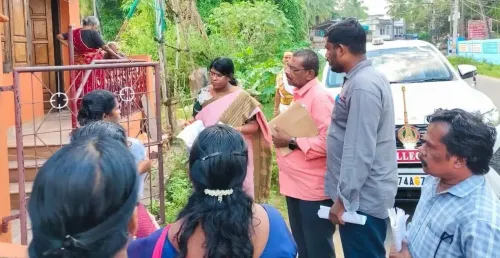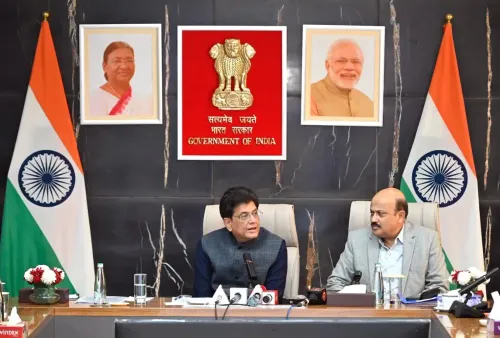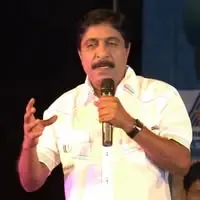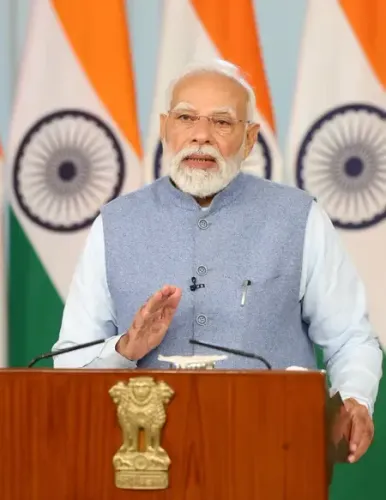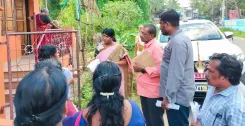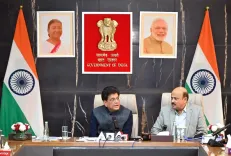Karnataka's CM Siddaramaiah Embraces 6 Surrendered Maoists with Roses and Indian Constitution
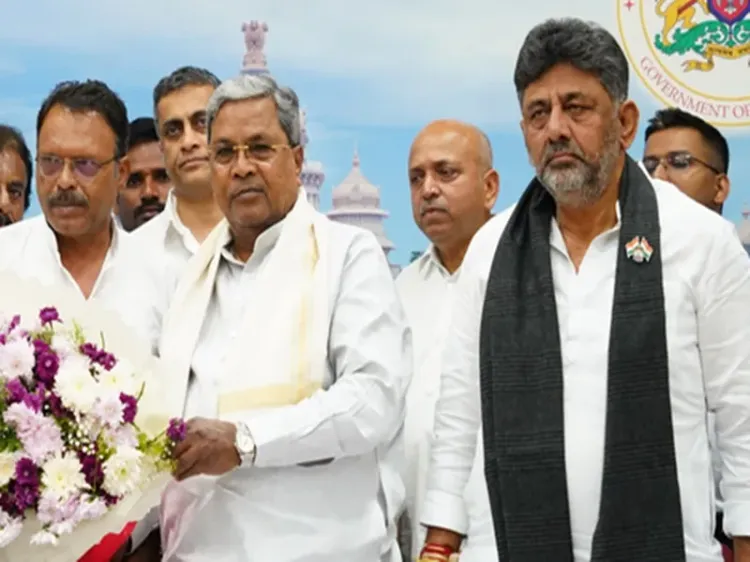
Bengaluru, Jan 8 (NationPress) The Chief Minister of Karnataka, Siddaramaiah, on Wednesday welcomed the surrendered Maoists into the mainstream by presenting them with roses and copies of the Indian Constitution at his office ‘Krishna’ in Bengaluru.
With the surrender of these six Maoists, the Congress-led administration has declared Karnataka a Left-Wing Extremism (LWE)-free state.
The six individuals have laid down their arms, signifying their intention to reintegrate into society. They symbolically presented their 'green uniforms' to CM Siddaramaiah during the event.
In a statement to the media following the surrender, CM Siddaramaiah remarked: "We are dedicated to eradicating Naxalism in Karnataka and addressing the underlying issues through all necessary legal measures."
"The Constitution and democracy do not permit the pursuit of justice through armed conflict," CM Siddaramaiah emphasized.
"Advocating against injustice and oppression is not inherently wrong. The Constitution provides a platform for striving for systemic change, but such advocacy must occur peacefully and within the law.
"There is no allowance for Naxalism or armed conflict in a democratic system or the Constitution. Historically, many former Maoists have abandoned violence and successfully reintegrated into society. The government has always supported their rehabilitation," the Chief Minister stated.
Furthermore, he mentioned: "During a prior discussion with members of the ‘Shantigaagi Naagarikara Vedike’ (Citizens’ Forum for Peace), I was informed about their initiatives to encourage Maoists to renounce violence. I assured them of government support for those wishing to reintegrate."
The Chief Minister also noted: "Democracy permits peaceful protests and struggles. While the government does not oppose these actions, it will not remain passive if laws are broken. Our administration is committed to addressing injustice. We aim to ensure that no individual experiences injustice."
"We have launched numerous initiatives aimed at empowering the economically and socially disadvantaged. Programs like Shakti and Griha Laxmi are designed to provide dignity and opportunities for underprivileged individuals, enabling them to lead improved lives. Meaningful societal change can only occur when the economically and socially weaker sections are strengthened. We openly declare that Naxalites wishing to reintegrate will receive full support. I have assured them they will not be treated as criminals but as human beings," the CM reiterated.
Deputy Chief Minister D.K. Shivakumar stated: "The Karnataka government is pleased to announce that we are now declaring our state as 'Naxalite-free'. This achievement is the result of collective efforts from the government, law enforcement, and the team established for rehabilitation and negotiation with the Maoists."
Former Maoist, Mundagaru Latha, expressed gratitude after surrendering, stating, “We have been welcomed into the mainstream with respect by the Chief Minister, and we thank him. We have come with a change of heart and will continue our struggle lawfully and constitutionally.”
Six Maoists surrendered in the presence of Karnataka's Chief Minister Siddaramaiah at his office ‘Krishna’ in Bengaluru on Wednesday, expressing their intent to reintegrate into society by laying down their arms.
The arms surrender ceremony was attended by Karnataka's Home Minister G. Parameshwara and Deputy Chief Minister D.K. Shivakumar, along with the state's DGP and senior police officials.
The Maoists were transported to the CM's office from Chikkamagaluru. Initially, they intended to surrender to the district administration of Chikkamagaluru through the ‘Shantigaagi Naagarikara Vedike’ (Citizens Forum for Peace).
However, following CM Siddaramaiah's request to facilitate their surrender, they were brought to Bengaluru.
Mundagaru Latha from Mundagaru in Sringeri, Vanajakshi from Balehole in Kalasa, Sundari from Kutluru near Mangaluru, Marappa Jayanna Aaroli from Raichur, Vasantha T. aka Ramesh from Tamil Nadu, and N. Jeesha from Kerala surrendered in the presence of CM Siddaramaiah.
According to sources, Mundagaru Latha, the eldest daughter of a poor tribal family from Sringeri Taluk, left school in the 6th grade due to poverty and mistreatment by teachers. Her family faced threats of losing their home due to the Kudremukh National Park Project.
Disillusioned with the government's alleged indifference toward democratic protests, Latha and her family engaged in the movement opposing the project.
At the age of 18 in 2000, frustrated with the lack of response to peaceful protests, Latha resorted to armed resistance.
Since then, she has been affiliated with a guerrilla faction operating in Karnataka and Kerala. Over time, she has transitioned back to mainstream activism, re-emerging as a significant figure in democratic movements.
Despite only having studied up to the 6th grade, Latha displays exceptional clarity and commitment when discussing policies and their implications. She was recognized as a leader in the Maoist movement and is currently working towards justice for marginalized communities through democratic means.
Sundari is another tribal woman who grew up in poverty. The sixth among five siblings, she had to leave school after the 3rd grade due to financial constraints and the school's distance from her home.
Her family also faced threats of losing everything due to the Kudremukh National Park Project. When democratic protests proved fruitless, Sundari, like many others, took up arms.
Joining the Maoist party in 2004 at the age of 19, she became part of a guerrilla faction operating in Karnataka and Kerala.
She recalls the police raids and atrocities faced by her and her neighbors, memories that continue to haunt her.
Despite these challenges, Sundari maintains her fighting spirit and now aims to reintegrate into society, contributing to democratic movements for social change.
Vanajakshi, the senior-most member of the group, completed up to SSLC (10th grade). She dropped out of school in 1985 and became politically active in her village, serving as an unopposed member of the Gram Panchayat in 1992 and 1997.
As the eldest daughter of a large family with eight children, she learned typewriting and supported her family through tailoring.
Despite her political activism, Vanajakshi and her family could not safeguard their small plot of land from powerful individuals, leading to her mother's mental health issues and her brother's suicide.
Witnessing similar struggles among her community, Vanajakshi lost faith in the system. Influenced by the contemporary armed movements, she chose armed struggle as her path in 2000.
Since then, she has been associated with a guerrilla group active across Karnataka and Kerala.
Jayanna Aaroli, a Dalit youth from Aaroli village in Manvi Taluk of Raichur district, holds a Bachelor’s degree. During his college years, he was drawn to the Maoist movement prevalent in the region. The encounter killing of Bhaskar, a notable figure in the movement, deeply affected him and fueled his desire to join the cause.
As part of the government-announced rehabilitation package, Jayanna intends to allocate half of the monetary compensation he is to receive towards the development of the school in his village, as per sources.
Vasantha, a B.Tech graduate from Arcot in Vellore district, Tamil Nadu, grew up influenced by socially conscious ideologies and movements. Observing various struggles from a young age, he developed a strong inclination towards activism.
After completing his degree in 2010, Vasantha joined the armed struggle and became a member of a guerrilla group active in Kerala and Karnataka.
Jeesha, an Adivasi woman from Makkimala in Wayanad district, Kerala, is the youngest member of the group. She studied up to the 8th grade before joining the armed struggle in Kerala in 2018. In 2023, Jeesha relocated from Kerala to Karnataka alongside other group members, according to sources.


